Geriatric Psychiatrist
Dr. Valeria Serban has twenty years of experience practicing general adult psychiatry. She is a Board Certified clinical and geriatric psychiatrist with licenses to practice in eighteen states.


Dr. Valeria Serban
Medical School
Neurology Residency Training
Master of Philosophy (M.Ph.) - Neuroscience
Internal Medicine Residency
Neurology Residency
Doctor of Philosophy (Ph.D.) - Neuroscience
Clinical Neurophysiology Fellowship
Board Certification
Book an Appointment Online for Telepsychiatry
Board Certified Psychiatrist with Multiple State Licenses (MD)
Dr Valeria Serban is a Neuropsychiatrist with a special interest in treating psychiatric illness in the geriatric population. Her warm, caring personality, as well as her extensive knowledge of psychiatry and neurology enables her to support individuals and families through the aging process.
Dr Serban ‘s training in Neurology, allows her to understand at a functional level the changes that occur to the brain as we age. Dr Serban treats depression, anxiety, OCD, insomnia, bipolar disorder and psychosis in patients over sixty-five. As well as medication management, she enjoys supportive psychotherapy, and counselling patients through end-of-life issues.
Dr Serban also conducts dementia evaluations, and identifies and treats memory loss, cognitive decline, and dementia. She treats, insomnia, depression, and agitation, and works with patients and families to provide care for individuals experiencing cognitive decline.
Dr Serban believes that an understanding of the brain, on a structural level, and the changes which happen to the body, are important when treating patients over sixty-five. In addition she believes a geriatric psychiatrist should understand later life issues, such as retirement, medical illness, empty nest syndrome, bereavement, chronic pain and other challenges affecting older patients.
Dr Serban is looking forward to welcoming you and your loved ones to her geriatric psychiatry and Neurology practice.



Clinical Services: California, Illinois, New Jersey, New York, South Carolina

Forensic Psychiatry Services: All of US and Canada
Telepsychiatry Services
Medication
Management
Medication is sent electronically to your pharmacy and can be picked up the same day.
Psychotherapy
Services
Cognitive Behavioral Therapy, Psychodynamic Therapy, Family & Relationship therapy
Geriatric
Psychiatry
Psychotherapy, Psychiatric Medication & Collaborative Care
Some Conditions We Treat
How much does it cost to see an online psychiatrist at Gaba Telepsychiatry?
Your first online appointment with one of our psychiatrists will cost $400. The follow-up appointments will be $250. If you have out-of-network benefits, we can submit claims on your behalf.
What is a Geriatric psychiatrist?
After retirement people can enjoy their time traveling, enjoying activities, and spending time with their families. Being able to spend time with their loved ones and invest in activities that bring joy and happiness are things that most retired people look forward to.
While many seniors do just that, others may have to keep a tight rein on their lifestyle and diet to ensure good health. A person can suffer from unforeseeable health complications; it may lead to medical conditions with multiple medications with some of them having side effects that may inadvertently affect their lives.
Aging is an inevitable process and can lead to many physical and emotional changes. Many age-related conditions are treatable and can be contained with the right diagnosis and treatment. Others can only be controlled with the right medications, therapy, and support.
A geriatric psychiatrist will consider the various psychological and medical factors of aging, to offer the best-suited solution. The first step in the evaluation process is to seek the right diagnosis, treatment, and support.
Dr. Serban will consider your medical history, such as hormones and nutrition; they will also consider psychodynamic factors to offer a tailored treatment plan. With a customized treatment plan, you can expect an improvement in symptoms and your overall quality of life.
What age groups can a geriatric psychiatrist treat?
A geriatric psychiatrist must complete their psychiatry residency and board certification. They can hence, treat everyone above the age of 18 years. However, they have a special interest in caring for elderly patients and are comfortable treating people over 65 years of age.


What is the difference between a geriatric psychiatrist and a regular psychiatrist?
A geriatric psychiatrist can treat all adults above the age of 18. However, they also specialize in treating age-related cognitive decline.
They are comfortable and experienced in treating patients with a medical history, age-related illnesses, multiple medications, and other concurrent comorbid conditions that may result in psychiatric symptoms.
They also consider drug interactions and titrate medication stringently, keeping in mind other coexisting conditions that may be present.
A Geriatric psychiatrist or GPsy trains at least for a year after the four years of adult psychiatry residency training. The geriatric psychiatrist gets an additional qualification from the American Board of Psychiatry and Neurology in general psychiatry certification exam.
They then clear a Geriatric Psychiatry certification, specializing in late-life psychiatric illnesses. During this extended period of training, psychiatrists learn how to evaluate, diagnose, and treat age-related illnesses. They are also educated on patient care, medical knowledge, professionalism, and practice-based learning for older people.
Why see a geriatric psychiatrist if you are over 65?














The challenges that accompany old age are sometimes unavoidable. However, that does not mean that you need to suffer because of age.
An elderly person can experience various setbacks, which can impact their physical and mental well-being. However, that need not define their lives.
Often chronic medical conditions can lead to depression, loss of family members or friends can mean less emotional support; retirement, empty-nest syndrome, and medical sensitives can affect one physically and psychologically.
The average life expectancy of a man and a woman in the US is 76.1 years; there has been a decline in the average life expectancy from 77 years.
Women in the US have an average life expectancy of 79.3 years. The average age of life expectancy for men stands at 76.3 years.
Studies conducted between 2001 and 2021, show that suicide rates have been the highest amongst men aged 75 and above. This shows that many older men suffer from untreated mental health problems.
With a higher life expectancy, women are more prone to suffering from losses, such as losing their independence, losing their partners, death of family members, and other life experiences.
Visiting a geriatric psychiatrist can provide the much-needed clarity and assistance to improve the quality of your life. You can get the support you need, and not face these challenges alone.
Visiting a geriatric psychiatrist is ideal if you are dealing with:
- Death of close family/sibling/friends
- Caring for an ill spouse or parent
- Experiencing cognitive difficulties
- Experiencing marital conflict with the empty-nest syndrome
- Dementia
- Drug interactions
- Chronic pain from other medical conditions
- Medication sensitivity and titration due to compromised kidney or liver functions
- End-of-life troubles such as writing wills, testaments, etc.
- Boredom, not feeling useful or productive
- Unable to tackle daily challenges
- Loss of independence, loss of identity
- Concerns about spirituality, mortality, and life purpose.
Lower doses of medication should be prescribed for people above the age of sixty-five, as often, medications do not clear through the kidney and liver fast enough. The high doses of medication can then accumulate and cause side effects.
People over sixty-five are significantly more likely to suffer from concurrent medical illness, chronic pain, and drug interactions if the psychiatrist does not have expertise in treating this age group.
Delirium, serotonin syndrome, and EPS are also common if medications are not dosed and prescribed correctly.
Serotonin syndrome can occur due to too much serotonin in the body because of adverse drug interactions.
Extrapyramidal side effects (EPS), or EPS is a drug-induced movement disorder. It is most commonly a result of the drug interactions from dopamine-receptor blocking agents.
An experienced geriatric psychiatrist should consider the above issues when providing psychotherapy or prescribing medication to individuals over 65 years old.
Can a geriatric psychiatrist diagnose dementia?
Yes, a geriatric psychiatrist is qualified to diagnose dementia. Dementia is a neurocognitive disorder and can be categorized as reversible and irreversible dementia. It is estimated to affect 5% of the population above the age of 65 and up to 20% by the age of 75 years old.
Reversible dementia refers to underlying medical conditions that have symptoms of cognitive decline, although not severe enough for a clinical diagnosis. This form of dementia is treatable and a person can make a full recovery with the correct diagnosis.
Irreversible dementia has three kinds:
Vascular dementia is a slow progression type, which means that with medication and lifestyle changes, a person can enjoy many active years after the diagnosis.
Alzheimer’s Disease is a medium progressive kind. With an Alzheimer’s diagnosis, environmental support, medications, and therapy, can help a person lead a normal life for a few decades.
Lewy Body dementia is a fast-progressive form of the condition. People suffering from LBD have an average time span of five to eight years. In some cases, the conditions can span between 2 years to twenty years.
Your geriatric psychiatrist will first ascertain if the symptoms are occurring due to other underlying medical conditions. The symptoms may be improved with accurate diagnosis, therapy, medication, and support.
A dementia diagnosis can be overwhelming. However, with an early intervention, the symptoms can be treated or controlled. Reach out to our specialist about your symptoms and medical history.


Can a geriatric psychiatrist treat dementia?
Yes, a geriatric psychiatrist can treat dementia and other psychological conditions. Reversible dementia can be treated; it is often the case that other underlying conditions cause psychiatric symptoms.
Reversible dementia patient can completely recover from their symptoms. Irreversible dementia symptoms may be managed with a tailored treatment plan.
Dr. Serban will be able to establish effective therapy and medication to manage dementia symptoms. A thorough medical, hormonal, and nutritional evaluation is completed to ensure that you receive the best supportive care with an optimal treatment plan.
What is reversible dementia?
Reversible dementia is a condition that mimics the behavioral and cognitive decline of dementia; however, the symptoms are not severe enough for a clinical dementia diagnosis.
These symptoms can be treated and are curable. Some of the causes of reversible dementia are
- Vitamin deficiencies
- Metabolic diseases or abnormalities
- Drug effects and interactions
- Depression
- Smoking
- Excessive alcohol consumption
- Inflammation
- Lung Problems
- Sleep issues
- Stress
- Inflammation
A patient suffering from any of the above conditions may experience symptoms that mimic dementia. Dr. Valeria Serban will evaluate by asking and discussing symptoms, medical history, and any medications that may result in psychiatric symptoms.
Many elderly people experience age-related cognitive decline and suffer alone; reaching out to a geriatric psychiatrist for support can drastically improve their lives.
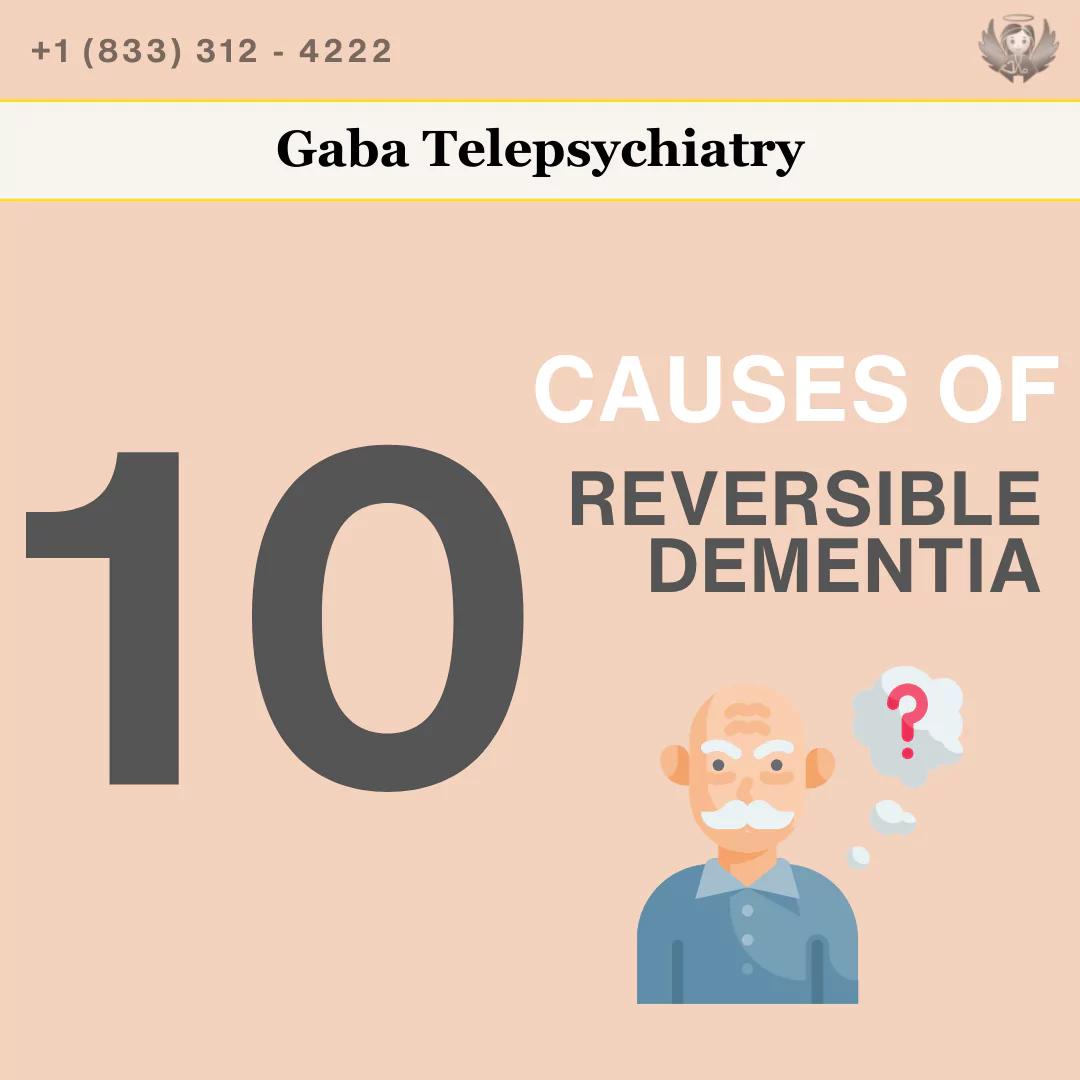
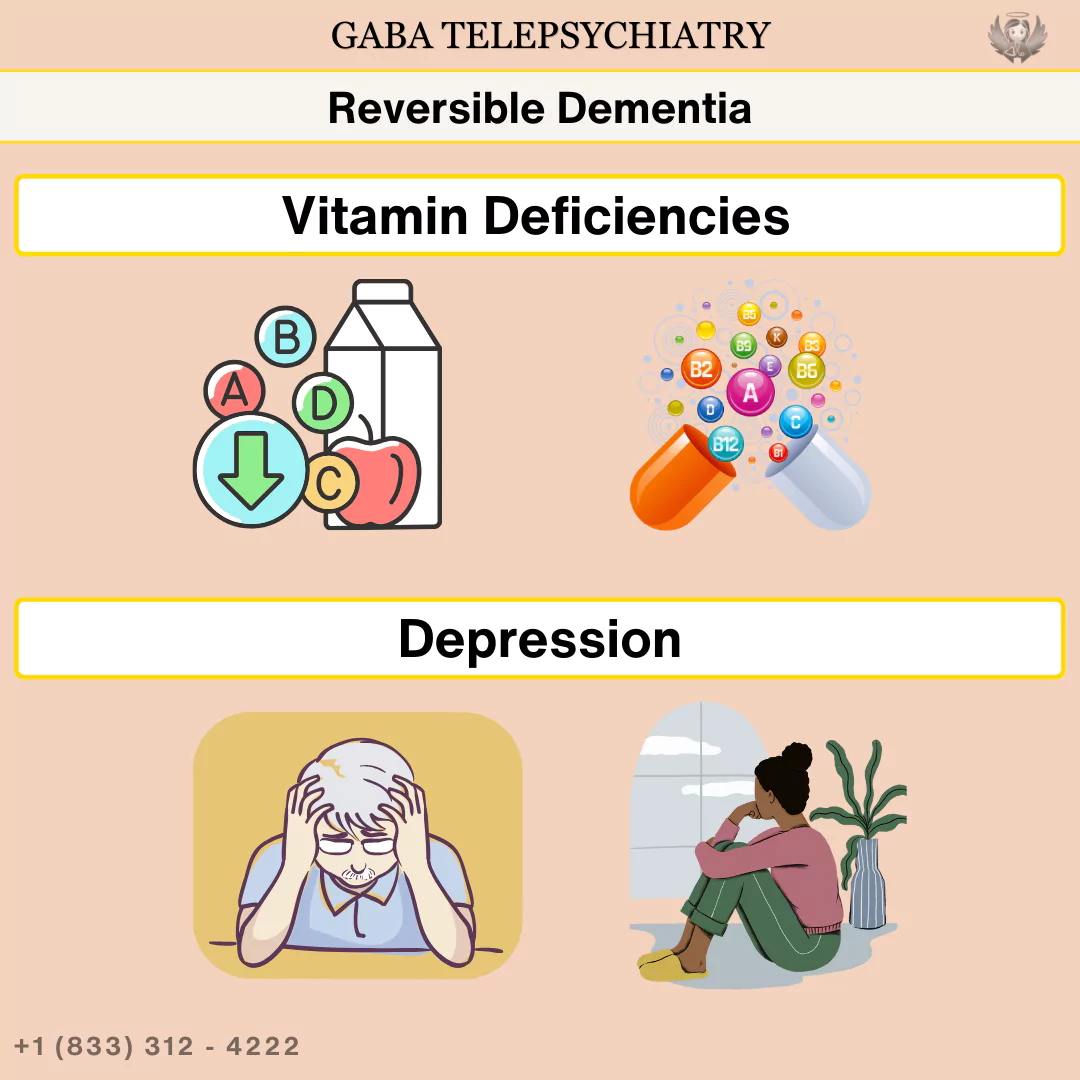
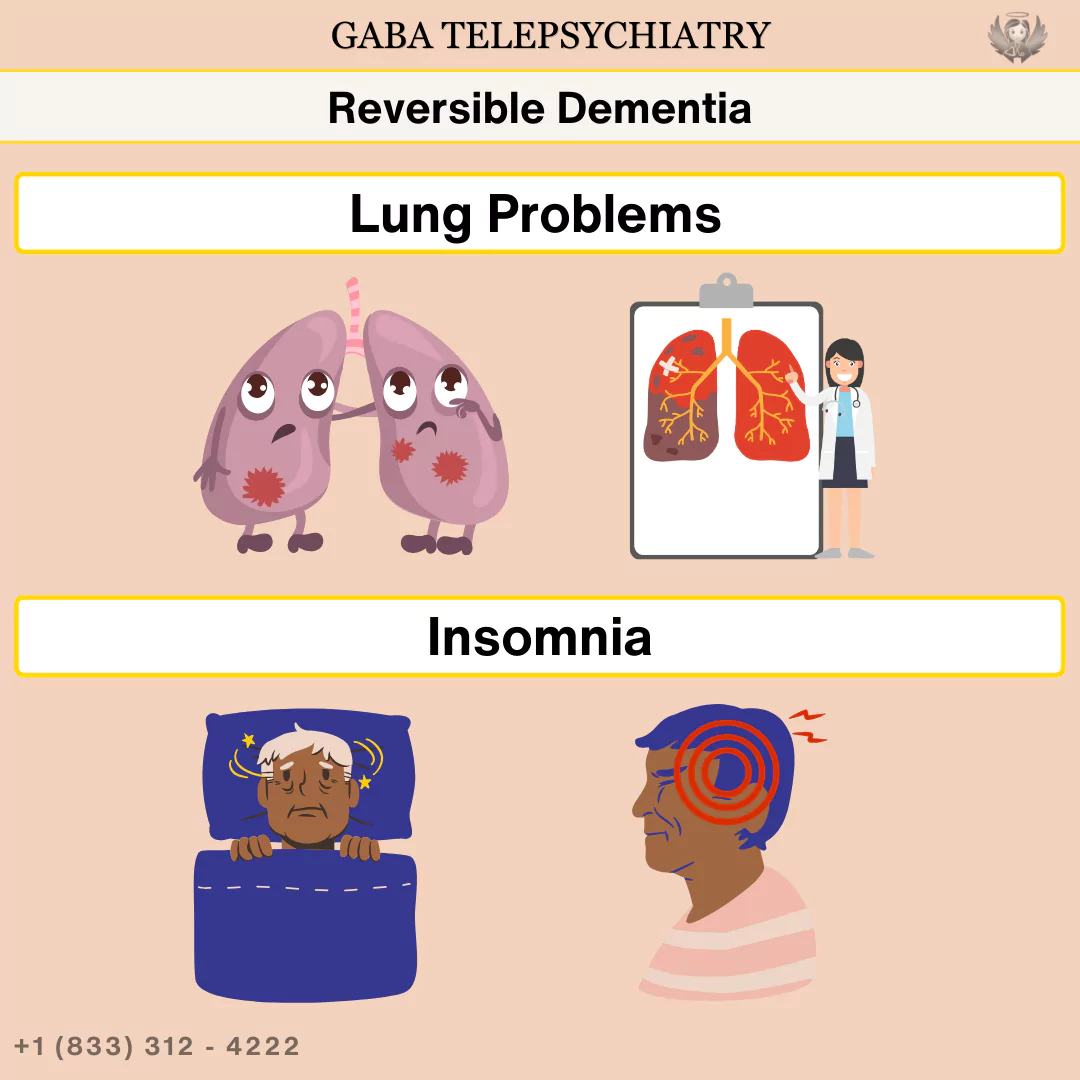
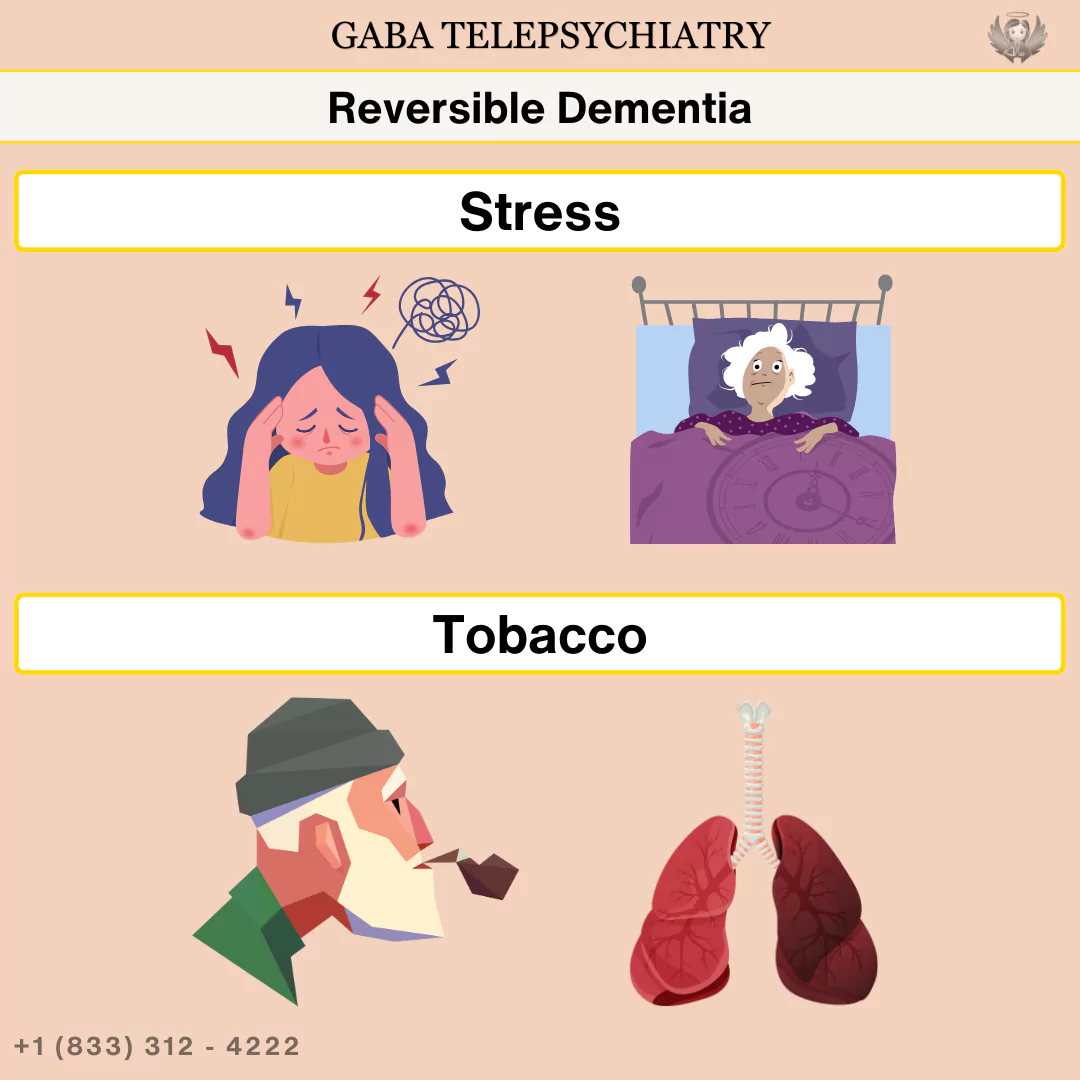
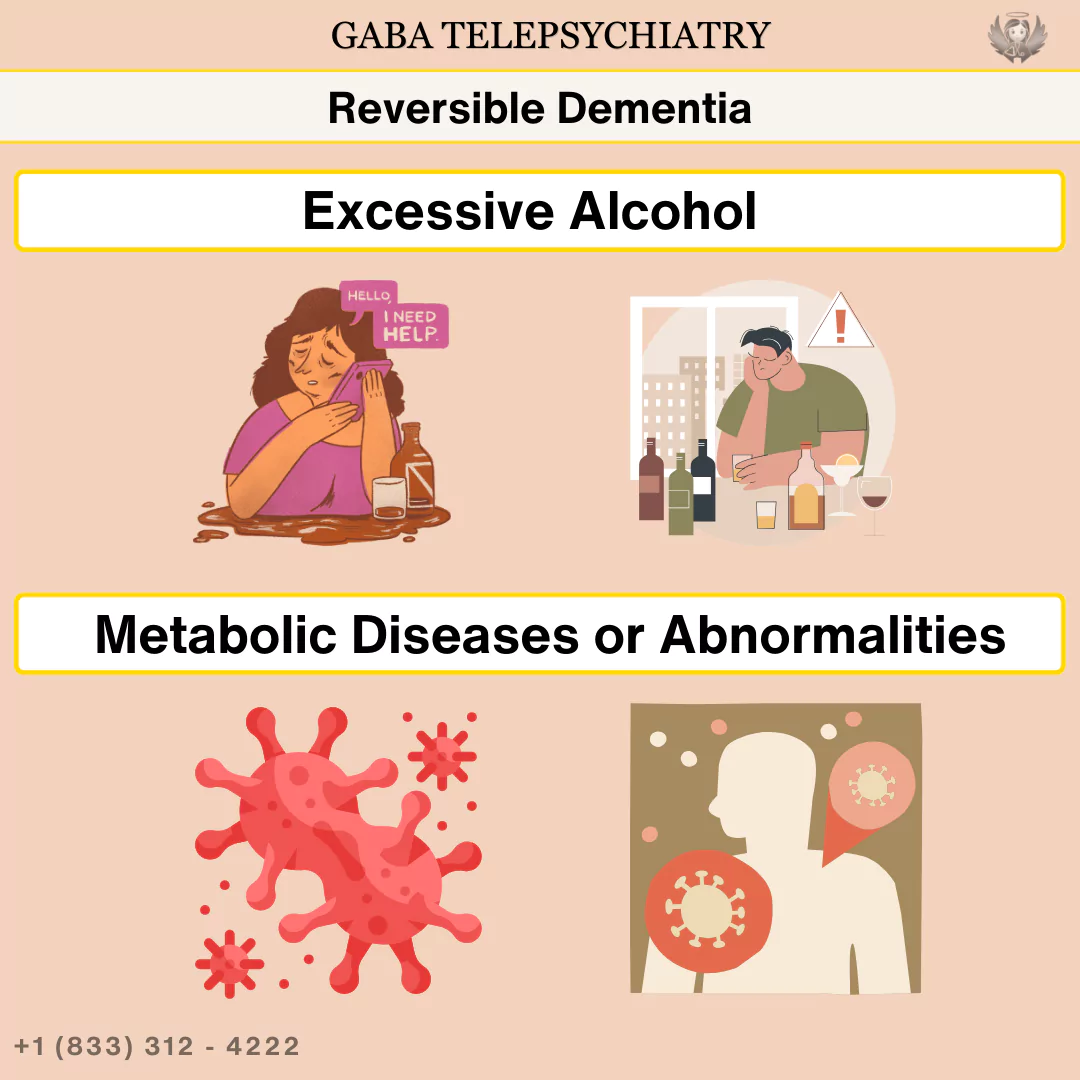
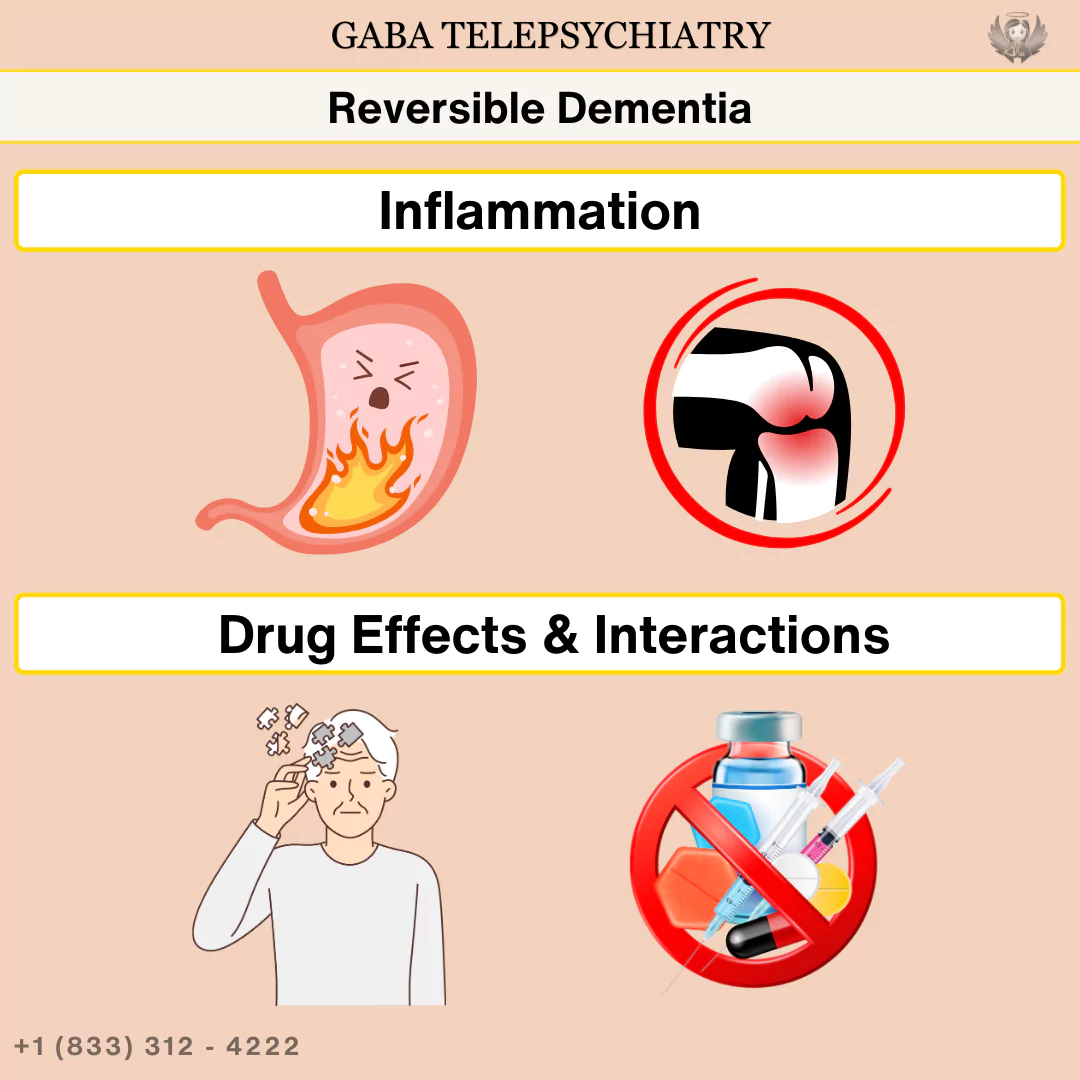
What is irreversible dementia?
Irreversible dementia refers to conditions where there’s been irreversible brain damage. Irreversible dementia can be categorized as slow, medium, and fast progression types.
Irreversible dementia comprises
Vascular dementia (VaD): Vascular dementia occurs after a stroke. Cardiovascular and cerebrovascular diseases are the main causes of this form of dementia. Strokes can be categorized as transient ischemic attacks (TIA) and Atrial fibrillation (Afib).
Alzheimer’s disease: Around 6.5 million people above the age of 65 in the US are affected by Alzheimer’s disease. There isn’t any one medication that can improve the symptoms of the disease, but several FDA-approved medications work in tandem to slow the progress of the illness. As of today, there is no cure for the disease.
Lewy Body dementia: This condition occurs when there is a build-up of Lewy body proteins (alpha-synuclein) clumps in the brain. These start a chain of chemical reactions that affect thoughts, movement, mood, and behavior. Lewy Body dementia is a rarer form of dementia affecting the population.
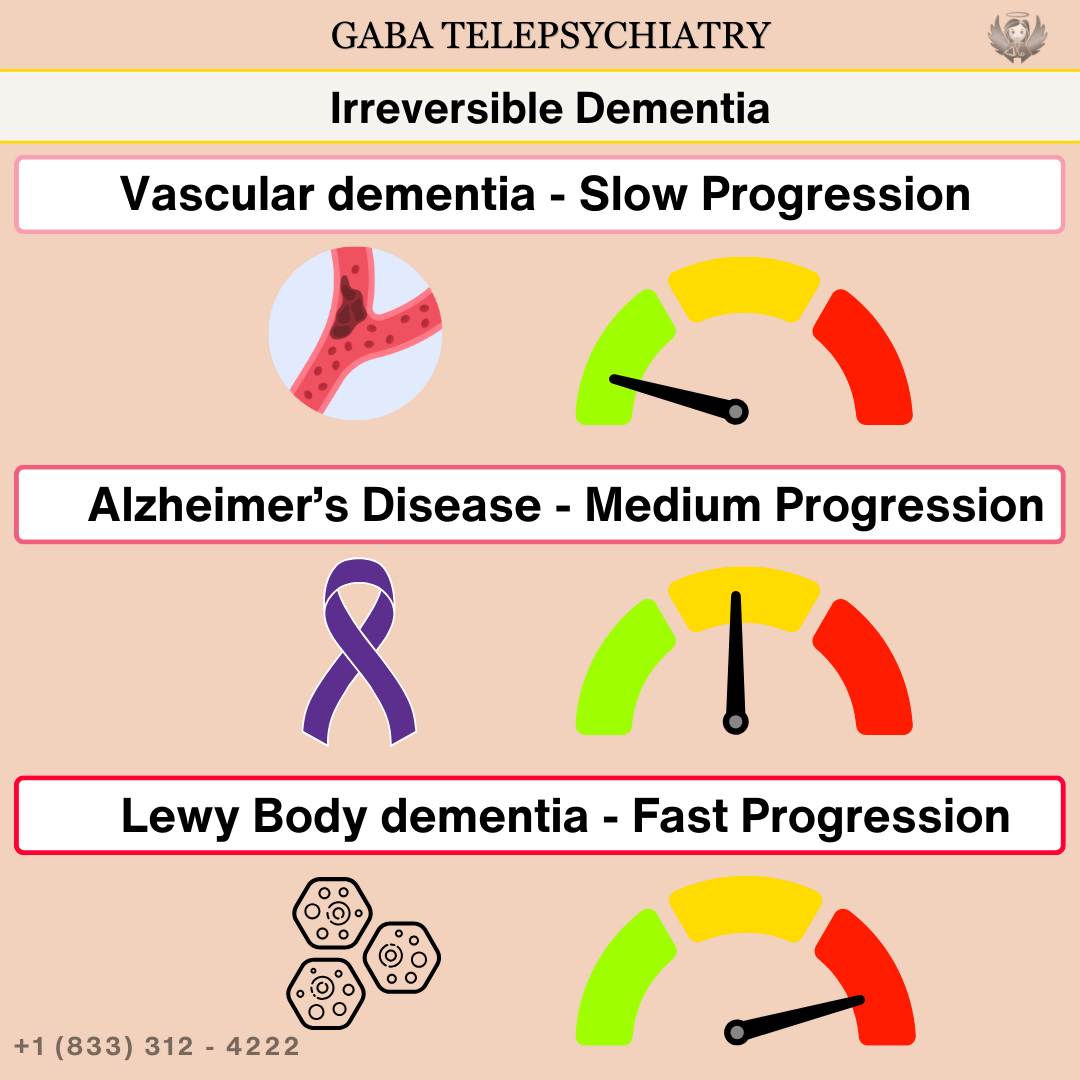
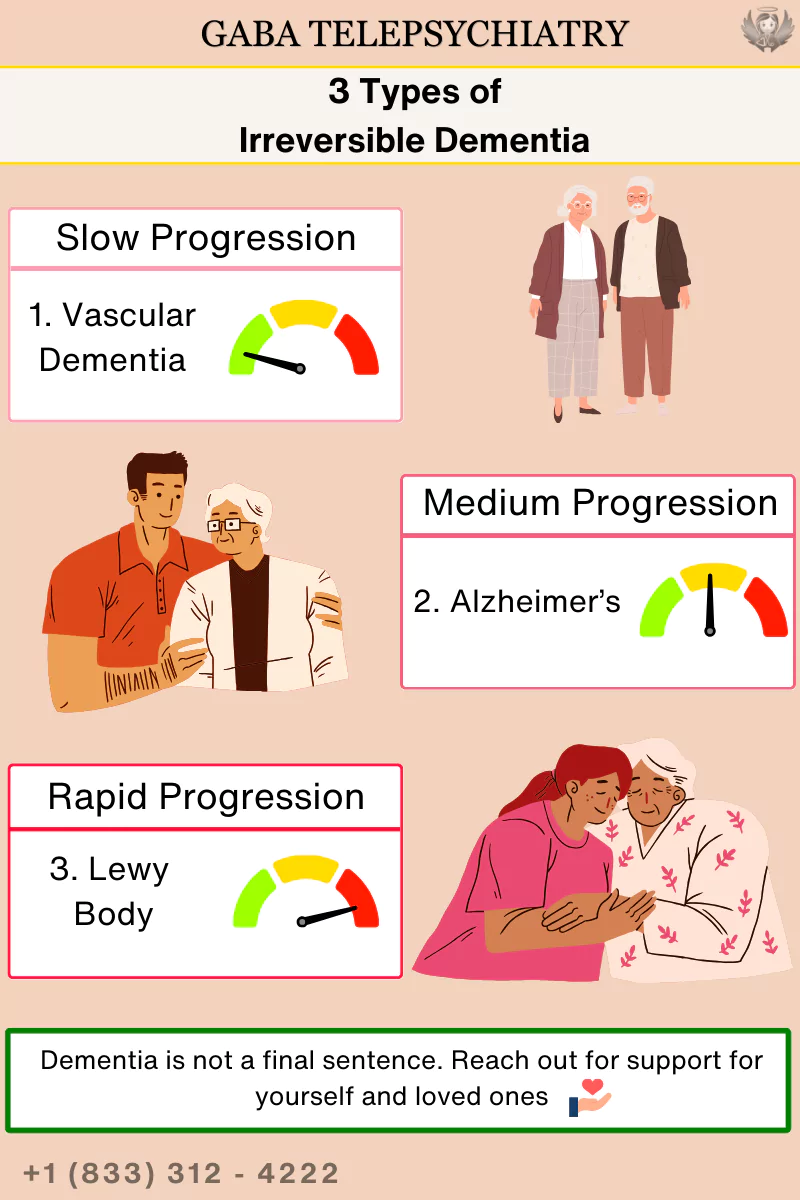
What can you expect during a dementia evaluation?
After the initial screening with Dr. Valeria Serban where symptoms and medical history are discussed, she will conduct a series of tests to measure the degree of cognitive impairment. The most widely used assessments for dementia care are
Mini-Mental State Exam (MMSE): This is a brief test that evaluates various factors of the cognitive abilities of the elderly. The MMSE is very basic and easy to understand; it involves doing simple calculations and following instructions.
Mini-Cog: This test involves a very common dementia assessment called the “clock drawing test”, which tests a person’s memory. It requires the person to draw a clock; they are asked to point out the correct times that are being called out.
Informant Questionnaire on Cognitive Decline in the Elderly (IQCODE): This test is meant for family and friends of the person being evaluated, also known as the informant. It asks them to consider their behavior from a decade ago and compare it to what it is now. It is meant to highlight the differences and problem areas.
General Practitioner Assessment of Cognition (GPCOG): A medical professional reviews the informants’ evaluations and also considers the “clock drawing test” to conclude the patient’s cognitive abilities and others’ perceptions of them.
These evaluations help the geriatric psychiatrist decide on the right therapy and medications when needed for their patients.
Reach out to us and book an appointment with Dr. Valeria Serban if you feel yourself or know someone who is struggling. With the correct diagnosis, there can be a significant improvement in your quality of life.
What conditions can a geriatric psychiatrist treat?









A geriatric psychiatrist has trained in adult psychiatry and can treat all adults above the age of 18. A geriatric psychiatrist also specializes in evaluating, diagnosing, and treating various conditions that commonly affect people after the age of 65.
A geriatric psychiatrist will also treat the following:
Delirium: Delirium can occur due to several conditions. For instance, it may be due to some medications that do not suit the patient, or it may be a combination of medications with other medical conditions.
There is a significant change in a person’s cognitive abilities highlighted by a lack of awareness and confusion.
Up to 42% of hospitalized people are affected by the condition. However, in most cases, the underlying causes of delirium are treatable and can be cured with the right diagnosis.
Depression: Depression is a disorder that can affect people from all age groups; however, the elderly are more susceptible to it. Often loneliness and social isolation exacerbate the condition, which many elderly people are prone to. Depression is usually treatable with therapy and medication.
Of the many medications used to treat depression, benzodiazepine is a common one. Its use must be carefully titrated, as many seniors experience severe side effects.
These can range from moderate to severe impairment, such as severe confusion, lethargy, increased chances of accidental falls, and bone fractures. It can also impair a person’s driving skills with a higher risk of crashes, and emergency room visits.
Seniors using benzodiazepine for long-term treatment usually become dependent on it. It can expose them to difficult consequences, such as delirium from withdrawals, and seizures.
Depression, or the underlying cause of the symptoms can be evaluated and treated. A combination of therapy, support groups, and medications can help those suffering recover over time.
Dementia: This condition affects as much as 20% of elderly people above the age of 75. Although the chances of having dementia increase with age, it is not a normal part of aging.
If detected in the early stages, the progress of the condition may be slowed. Treatment can include medications, psychotherapy, and environmental support.
Mood disorders: Several mood disorders affect elderly people. Up to 35.3 % of geriatric depression is mild, 51.9% moderate, and 12.7% severe.
It is fair to state that the chances of having mood disorders increase after a certain age. However, it shouldn’t be considered a normal part of aging.
The evaluations for mood disorders primarily provide differential diagnoses to screen out any underlying medical conditions and deficiencies that may be treatable.
Mood disorders in the elderly can be controlled with therapy, support, and medications. With the right support and treatment plans, you can live a balanced life.
Anxiety disorders: Anxiety disorders affect up to 4% of adults worldwide; as opposed to what many believe, it is not a natural process of aging. Anxiety disorder can be treated and controlled. Several anxiety disorders are frequently overlooked, or simply misdiagnosed.
Generalized anxiety disorder or GAD is often misdiagnosed; anxiety is also often accompanied by depression.
An evaluation consists of discussing symptoms and behavior, which the patient may normalize or underplay; this is often a sign of anxiety. The severity of the symptoms and the impairment of their abilities are measured for the right diagnosis.
Psychosis: An onset of psychosis in the elderly is very frequently a sign of dementia in the elderly. Other causes of psychosis are delirium, schizophrenia disorders, major depressive disorder (MDD), and bipolar disorder are known as the primary causes of psychosis.
This means that the symptoms are directly caused by the psychiatric conditions. Secondary psychosis occurs when there are other underlying causes and drug interactions. Treatment usually consists of therapy and medications.
Some antipsychotic medications can sometimes lead to heart arrhythmia in seniors. Medication titration is crucial, as for many suffering from kidney or liver issues, the side effects can be devastating.
However, with careful monitoring, psychosis in the elderly can be controlled with medications. A geriatric psychiatrist can help immensely in such situations.
Substance abuse: Substance abuse is much less amongst the elderly, however, the numbers are currently on the rise. Most people with substance abuse problems abuse alcohol, within this age group.
Another factor is that often, prescribed medications are abused intentionally or unintentionally. This happens when a person either forgets to take their medications or takes double dosage due to memory issues or addictions.
With therapy and sometimes with medication, substance abuse can be controlled.
Personality disorders: These disorders affect many geriatric patients. The numbers range from 10.6% to 14.5% for aged people still within the community, and 57.8% when based in nursing homes.
Personality disorders are hard to evaluate, although it is a common illness. Typically, personality disorders are categorized as cluster A, cluster B, and cluster C; they are also generally diagnosed at a younger age.
Cluster A: paranoid, schizoid, and schizotypal
Cluster B: antisocial, borderline, narcissistic, and histrionic
Cluster C: avoidant, dependent, and obsessive-compulsive
Many elderly patients diagnosed with personality disorders see an improvement in their behaviors and symptoms. Some feel remorse for the years of poor behavior leading to difficult circumstances and broken relationships.
Other bio-psycho-social issues: Many elderly patients lose their partners, family members, and friends as they age. Compromised independence, health problems, and financial issues, all could be factors that can lead to anxiety and depression.
Dr. Valeria Serban can help prevent, evaluate, diagnose, and treat patients experiencing psychiatric symptoms because of medical conditions, drug interactions, and other factors. Getting the correct diagnosis and support can enhance your quality of life.
Can a geriatric psychiatrist treat depression in the elderly?
Yes, depression is one of the most common psychiatric illnesses affecting individuals over 65. Depression in the elderly is usually treatable but is often left untreated. Low moods, low energy, low productivity, loss of interest in activities, and somatic symptoms such as aches and pains are often attributed to old age.
As a result, depression diagnosis, unfortunately, is missed in elderly patients. Many with their depression under control, lead happy, active, and engaging lives.
With age may come the onset of various physical and mental ailments, however, many of them are curable with the correct diagnosis, therapy, and medications. No one should suffer silently.
If you or your loved ones are struggling, experiencing confusion, memory loss, hallucinations, loss of interest in activities or social interactions, or any other mood, or psychological symptoms, then it is advisable to get in touch with a geriatric psychiatrist without delay. The correct diagnosis and treatment can drastically improve lives.
Dementia is not a final sentence. Reach out to a geriatric psychiatrist for support for yourself and your loved ones.


